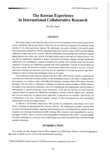The Korean Experience in International Collaborative Research
JIRCAS international symposium series
| ISSN | 13406108 |
|---|---|
| 書誌レコードID(総合目録DB) | AA1100908X |

本文フルテキスト
intlsymp-12_125-128.pdf172.12 KB
The Korean version of the Green Revolution has been the firm foundation of the economic growth of the country, specifically with the government's prime focus on self-sufficiency programs in rice and labor-saving activities for the whole agricultural industry. The achievement was partly attributed to the benefits gained from international collaboration with the international agricultural research centers (IARCs) and the bilateral collaboration forged with several countries. With the collaboration, the knowledge and technologies acquired helped generate and produce new varieties with high-yielding capacity and improved cultural practices. One area that has significantly contributed to Korea's agricultural development programs through international collaboration is its commitment to capacity development for scientists. This is and has always been the prime component in designing our collaborative programs with various stakeholders. Through the internal effort and help from outside, the Rural Development Administration (RDA) has evolved to become a national agricultural research and extension system that has the capabilities of solving the national agricultural problems as well as assisting other developing countries in the region.
As the national economy improved starting in the early 1980's, RDA has also assumed a significant role in international collaborative research activities to help developing countries in the region. Learning from its past experience as a recipient country of the Official Development Assistance (ODA), RDA shares what it has developed. Thus, the mode of collaboration is designed to include the capacity building of NARS scientists, the transfer of key agricultural technologies such as rice breeding and seed multiplication, and the sharing of methodologies to improve technology transfer mechanisms. In the past, rice had been the most frequently requested subject for research and collaborative undertaking. Nowadays, however, upland crops, vegetables, and livestock production are gaining much importance in agricultural development. Specifically, the transformation of the basic 'Saemaul Undong' concepts on rural development has been successfully implemented in several developing countries.
In addition to the bilateral collaboration, RDA pursues its collaborative undertakings with several IARCs, including the International Rice Research Institute. The collaboration includes: sending RDA scientists as the seconded scientists, supporting special training courses, providing funds for strategic research programs, and co-hosting international scientific meetings. RDA welcomes more responsibilities to actively participate in IARCs' efforts to solve the world food problem. Participation within IARCs' consortia together with other stakeholders is a necessary step to tackle longer-term projects and significantly contribute through research collaboration.
As the national economy improved starting in the early 1980's, RDA has also assumed a significant role in international collaborative research activities to help developing countries in the region. Learning from its past experience as a recipient country of the Official Development Assistance (ODA), RDA shares what it has developed. Thus, the mode of collaboration is designed to include the capacity building of NARS scientists, the transfer of key agricultural technologies such as rice breeding and seed multiplication, and the sharing of methodologies to improve technology transfer mechanisms. In the past, rice had been the most frequently requested subject for research and collaborative undertaking. Nowadays, however, upland crops, vegetables, and livestock production are gaining much importance in agricultural development. Specifically, the transformation of the basic 'Saemaul Undong' concepts on rural development has been successfully implemented in several developing countries.
In addition to the bilateral collaboration, RDA pursues its collaborative undertakings with several IARCs, including the International Rice Research Institute. The collaboration includes: sending RDA scientists as the seconded scientists, supporting special training courses, providing funds for strategic research programs, and co-hosting international scientific meetings. RDA welcomes more responsibilities to actively participate in IARCs' efforts to solve the world food problem. Participation within IARCs' consortia together with other stakeholders is a necessary step to tackle longer-term projects and significantly contribute through research collaboration.
| 作成者 | Dae-Geun Oh |
|---|---|
| 公開者 | Japan International Research Center for Agricultural Sciences |
| オンライン掲載日 | |
| 号 | 12 |
| 開始ページ | 125 |
| 終了ページ | 128 |
| 言語 | eng |
